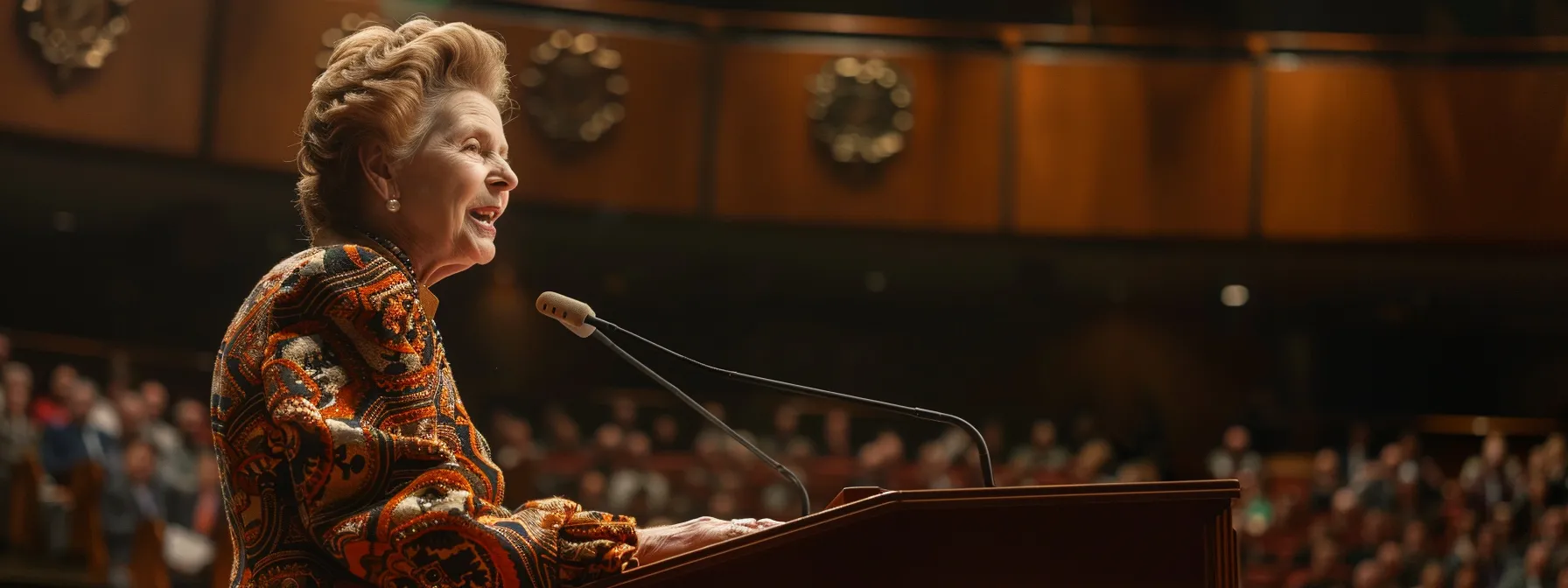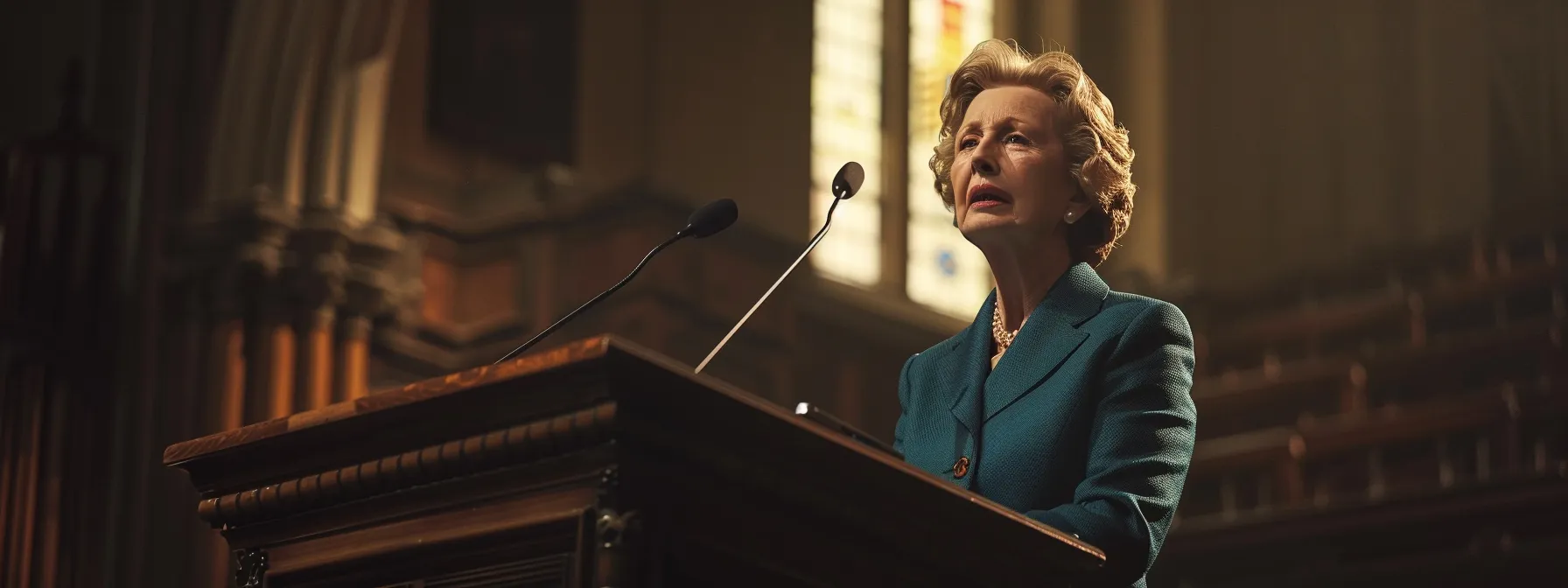Disclaimer: We sometimes use affiliate links in our content. For more information, visit our Disclaimer Page.
Margaret Thatcher remains a polarizing figure in modern politics. Many see her as a staunch defender of economic policy that reshaped Britain’s gross domestic product, while others view her actions during The Falklands play as controversial. This article will explore Thatcher’s formative years, her rise through the Conservative Party, and her eventual ascent to Prime Ministership, similar to Winston Churchill in his era. Readers will gain insights into her leadership style and how her memoir has influenced perceptions of her legacy, helping to unpack the complexities surrounding her impact on Britain’s political landscape.
Key Takeaways
- Margaret Thatcher’s early life shaped her commitment to personal responsibility and conservative values
- Her academic achievements and scholarships reinforced her ambition within the political arena
- Thatcher demonstrated resilience by overcoming early electoral defeats to secure her parliamentary seat
- Her focus on economic reform and free-market principles marked a significant shift in British politics
- Thatcher’s leadership against union influence and economic decline defined her tenure as Prime Minister
Margaret Thatcher’s Formative Years and Early Influences

Margaret Thatcher’s early years in Grantham laid the foundation for her future as a prominent politician. Her academic achievements, supported by scholarships, shaped her intellect and ambition. Additionally, her initial encounters with conservative ideals played a crucial role in her political development. This background set the stage for her later influence in the House of Commons, particularly in collaboration with figures like Geoffrey Howe, a notable Chancellor.
Growing Up in Grantham
Growing up in Grantham, Margaret Thatcher experienced a mix of traditional values and the realities of post-war Britain. This small market town not only witnessed her development but also instilled a sense of practicality in her. As she navigated her formative years, the welfare state and the emerging National Health Service were significant topics of discussion, shaping her understanding of government roles and responsibilities.
Thatcher’s early life in Grantham was marked by the influence of her father, a local grocer, who instilled strong work ethics and a commitment to personal responsibility. The coal mining industry that surrounded her town was crucial to her understanding of economic challenges faced by the nation. These experiences laid the groundwork for her ascent to becoming the Prime Minister of the United Kingdom, where she would later confront similar issues on a national scale:
- Growing up in a modest home in Grantham.
- Influence of her father’s work ethic on her ambitions.
- Encounters with conservative ideals nurturing her political foundation.
- Recognition of the welfare state and National Health Service shaping her views.
- Impact of the local coal industry on her understanding of economic realities.
Academic Pursuits and Scholarships
Margaret Thatcher’s academic pursuits began early, with her determination to succeed evident through her impressive school record. Attending Somerville College, Oxford, she studied chemistry and became actively involved in the university’s conservative society, which fostered her understanding of political ideologies. This exposure laid the groundwork for her future role as a leader in Parliament, where she would later address significant issues such as society’s views on Irish Republicanism and the Cold War dynamics with leaders like Mikhail Gorbachev.
While at university, Thatcher demonstrated exceptional dedication by earning scholarships that allowed her to further her education. This support not only helped her academically but also reinforced her belief in personal responsibility and the merits of hard work. These formative experiences equipped her with the skills needed to climb the ranks within the Conservative Party, positioning her to become one of the most significant leaders in British politics.
Introduction to Conservative Ideals
Margaret Thatcher’s introduction to conservative ideals occurred during her formative years, profoundly impacting her political journey. Engaging with conservative philosophies while attending Somerville College, Oxford, she cultivated a political perspective that emphasized personal responsibility and limited government. This ideological foundation set the stage for her future confrontations in the House of Commons, especially concerning issues like Harold Wilson’s leadership and the populism that influenced British politics at the time.
Her early exposure to these conservative principles also shaped her responses to significant challenges during her career, including the motion of no confidence that tested her leadership. Thatcher’s understanding of the complexities surrounding the Republic of Ireland and her interactions with political figures like David Cameron later underscored her commitment to these ideals, illustrating the lasting influence of her early influences on her political actions and decisions.
With her beliefs forming like steel under pressure, Thatcher stood at the edge of politics. The world awaited her voice, and she was ready to enter the fray.
Entering the Political Arena

Margaret Thatcher’s entry into the political arena marked a pivotal moment in her journey towards becoming Prime Minister. Her initial candidacies in parliamentary elections were met with setbacks as she faced early electoral defeats. However, her determination ultimately led to securing a seat in the House of Commons, where she began to engage with policies that included monetarism and addressed the recession. This section will explore her first electoral challenges, the resilience she demonstrated, and her rise within the shadow cabinet, setting the stage for her influential career.
First Parliamentary Candidacies
Margaret Thatcher’s first foray into parliamentary politics began in 1950 when she stood as the Conservative candidate for Dartford. Despite her well-prepared campaign and the support of established party figures, including Michael Heseltine, she faced challenges that resulted in a narrow defeat. This experience, while disheartening, reinforced her commitment to the principles of democracy and the need for persuasive diplomacy in addressing the welfare concerns of constituents.
Her persistent efforts paid off in 1959 when she finally won a seat in the House of Commons, marking a significant milestone in her political journey. This victory came during a critical Conservative Party conference, where the party sought to solidify its stance on key issues such as welfare reform and economic policy. Thatcher’s early experiences laid the groundwork for her influential role within the party, preparing her to tackle complex issues that would define her later leadership.
Overcoming Early Electoral Defeats
Margaret Thatcher faced significant challenges during her early attempts to enter the political sphere, including her 1950 candidacy in Dartford. Despite losing to her opponent, she demonstrated remarkable resilience, using this experience to refine her political approach and strengthen her resolve to represent her constituents in the future. This perseverance would later shape her policies on foreign policy and economic reform, playing a key role in the development of what would become known as Thatcherism.
By 1959, Thatcher’s persistence paid off as she successfully secured a seat in the House of Commons, marking the beginning of her impactful political career. Her initial electoral defeats taught her valuable lessons about effective campaigning, enabling her to rise within the Conservative ranks and ultimately challenge the leadership of Tony Blair and other contemporaries. The early struggles she faced laid the groundwork for her future influence within the British Empire and solidified her position against rival leaders like James Callaghan.
- Thatcher’s candidacy in Dartford (1950) faced defeat.
- Her experience refined her political approach.
- Resilience led to her eventual election in 1959.
- Lessons learned shaped her future campaign strategies.
- Early setbacks set the stage for her influence in British politics.
Securing a Seat in the House of Commons
Margaret Thatcher’s successful election to the House of Commons in 1959 represented a critical turning point in her political journey. This achievement was not only pivotal for her career but also positioned her to influence significant policies that would impact the nation, including healthcare reforms that could improve life expectancy. As she settled into her role, Thatcher began to address issues that shaped Britain, from economic challenges to foreign relations, highlighting her growing influence within the Conservative Party.
Once in Parliament, Thatcher focused on policies that reflected her ideals and ambitions. Her commitment to personal responsibility and economic reform would later be tested during her tenure at 10 Downing Street, where critical decisions regarding international affairs, including apartheid and its implications, shaped her leadership style. Her early experiences in the House of Commons equipped her to navigate complex political landscapes, ultimately leading to her significant role in British politics and culminating in a leadership that would withstand challenges, including her eventual resignation.
She stepped into the fray, ready to make her mark. The Conservative Party awaited, eager for fresh voices and new ideas to rise above the noise.
Rising Through the Conservative Party Ranks

Margaret Thatcher’s rise within the Conservative Party commenced with her appointment as Secretary of State for Education and Science, where she championed policies that aligned with her vision of conservatism. As a member of parliament from Lincolnshire, she began to build a strong reputation through her advocacy for privatization and other key Conservative initiatives. This section will delve into her significant contributions, the policies she promoted, and how these efforts solidified her standing in Parliament.
Appointment as Secretary of State for Education and Science
Margaret Thatcher’s appointment as Secretary of State for Education and Science in 1970 marked a significant moment in her political career, allowing her to champion key educational reforms. During her time in this role, she emphasized the need for efficiency and accountability in the education system, highlighting the importance of standards in schools. This focus on educational policies laid the groundwork for her later governance strategies during the Downing Street years, where her decisions would impact various sectors, including education and training across the United Kingdom.
In her capacity as Secretary of State, Thatcher also recognized the growing importance of higher education institutions, such as the University of Oxford, in driving innovation and economic growth. Her policies reflected a broader vision for the United Kingdom’s role within the European Union and its approach to Eastern Europe. This commitment to enhancing educational standards resonated with her ideology of personal responsibility, illustrating how her early decisions in this role would influence her subsequent premiership.
Advocating for Conservative Policies
During her rise within the Conservative Party, Margaret Thatcher became a staunch advocate for neoliberal policies aimed at reducing the state’s influence on the economy. She strategically positioned herself against entities such as the National Union of Mineworkers, whose strikes in the lengthy battles of the 1980s posed significant challenges to her administration. Thatcher promoted a vision of privatization and deregulation, which she believed was vital for fostering economic growth and enhancing individual responsibility, principles that would later define her governance.
Thatcher’s leadership was further solidified by her handling of the Falklands War, which showcased her resolve against external threats, particularly from the Soviet Union. Her strong stance not only rallied public support but reinforced her commitment to a robust national defense. Additionally, her opposition to the Greater London Council’s expansionist policies highlighted her belief in localized governance and reduced bureaucratic overhead, underscoring her focus on efficiency and accountability as a means to advance Conservative interests.
Building a Reputation in Parliament
During her tenure in Parliament, Margaret Thatcher effectively built a reputation as a formidable politician by navigating complex issues and advocating for substantial reforms. Her strong stance on economic policies, particularly in relation to unemployment benefits, showcased her commitment to addressing the economic challenges facing Britain. This dedication not only resonated with her Conservative colleagues but also positioned her favorably among party leaders like Nigel Lawson, who later became chancellor and aligned with her vision for a market-driven economy.
As Thatcher asserted herself in parliamentary debates, she addressed critical topics that shaped her political identity, reinforcing her image as a leader ready to tackle the pressing issues of her time. Her engagement with policies aimed at reducing governmental intervention provided the groundwork for her rise, aligning her with the ideals outlined in the ‘encyclopedia’ of Conservative values. These early experiences marked the beginning of her path to power, influencing her future initiatives as Prime Minister and her lasting legacy in British politics.
She had climbed high in the Conservative Party, earning respect and attention. Now, the real battle loomed ahead as she prepared to challenge the very leadership that had once welcomed her.
Challenging the Party Leadership

Assessing Edward Heath’s tenure reveals significant challenges within the Conservative Party, prompting Margaret Thatcher to campaign for party leadership. Her determination led to a pivotal victory that positioned her to address pressing issues such as communism and security threats, including the Brighton Hotel bombing. This section will explore her strategic assessments and the influential role of key figures like Bernard Ingham as she rose to prominence in Downing Street.
Assessing Edward Heath’s Tenure
Edward Heath’s tenure as Prime Minister was marked by significant challenges, particularly regarding Britain’s relationship with the European Economic Community (EEC). His administration faced criticism for its approach to economic policies, as many members of the Conservative Party believed that he prioritized European integration over domestic concerns. This environment created a space for Margaret Thatcher to question Heath’s strategies, especially in light of economic data from the Office for National Statistics that highlighted rising unemployment and inflation.
Thatcher’s assessments of Heath’s leadership revealed a growing discontent with his policies, particularly among party members who felt sidelined. During this period, figures like John Major began to emerge within party ranks, recognizing the need for a shift away from Heath’s direction. Moreover, Thatcher’s background, influenced by her father Alfred Roberts, instilled in her a focus on law and personal responsibility that stood in contrast to Heath’s more collectivist approach. This divergence set the stage for Thatcher’s eventual challenge for the party leadership, underscoring her vision for a different Conservative path.
Campaigning for Party Leader
Margaret Thatcher’s campaign for party leader in the late 1970s emerged from her sharp critique of Edward Heath’s leadership. As she positioned herself against the backdrop of rising national discontent and the aftermath of economic difficulties, her unwavering stance on key issues, including the sovereignty of Britain over the Falkland Islands, resonated with Conservative members seeking a decisive leader. Her ability to garner support further solidified her image as a formidable contender within the party, as she aligned with the growing conservative sentiments of the time.
With endorsements from influential figures, including those from the economic sphere like the Chancellor of the Exchequer, Thatcher cultivated a vision that appealed to the party’s core values. As her relationship with prominent allies, such as U.S. President Ronald Reagan, strengthened, her strategic insights into international affairs enhanced her credibility. Ultimately, her campaign for leadership led her to become the first female Prime Minister of the United Kingdom, setting a legacy that would later be recognized with accolades like the Order of the Garter.
- Critique of Edward Heath’s leadership.
- Resonance of key issues like the Falkland Islands.
- Support from influential conservatives.
- Relationship with Ronald Reagan emphasized her international stance.
- Legacy solidified with the Order of the Garter recognition.
Winning the Conservative Party Leadership
Margaret Thatcher’s victory in the Conservative Party leadership contest in 1975 marked a significant turning point in British politics, as she emerged as a leader during a time of considerable disarray within the party. With her background as a chemist, she brought a methodical approach to her campaign, emphasizing the dangers of unchecked liberalism and the need for a strong response to the geopolitical tensions of the Cold War. Her strategy effectively resonated with party members, many of whom were eager for a decisive figure who could navigate the complexities of an increasingly polarized political landscape.
During her campaign, Thatcher’s ability to articulate a vision for the future included addressing the criticism of Edward Heath’s leadership. Her appeal was not only rooted in her policy positions but also in her strong rhetoric, which underscored her commitment to revitalizing the party’s core principles, as evidenced in her speeches documented in the national archives. The culmination of her efforts solidified her position, granting her the leadership role that would enable her to embark on “the long walk to Finchley,” where she would begin to implement her transformative vision for Britain.
She stood at a crossroads, the weight of her choices pressing down hard. The fight was just beginning, and the voice of the opposition called to her with a promise of change.
Leading the Opposition

As the leader of the Conservative Party, Margaret Thatcher focused on formulating strategies against the Labour government while addressing significant national economic issues, including those related to socialism. Under her guidance and influenced by figures like Keith Joseph, plans were developed in preparation for the upcoming general election, alongside critical discussions surrounding the handover of Hong Kong and Northern Ireland. Each of these elements played a vital role in shaping her approach and positioning her as “The Iron Lady” in British politics.
Formulating Strategies Against the Labour Government
During her leadership of the Conservative Party, Margaret Thatcher focused on developing effective strategies against the Labour government, particularly as economic challenges widened under Edward Heath’s administration. She recognized the importance of addressing both currency issues and internal party divisions between the “wets and dries” to unify her base and present a cohesive opposition. The shift towards a more robust critique of government policy not only aimed to win public support but also to emphasize the Conservative Party’s commitment to tackling inflation and restoring economic stability.
Thatcher’s approach to opposition politics involved a clear articulation of conservative values, particularly in response to perceived failures of both Labour and Heath’s leadership. By navigating party dynamics and aligning with key figures who shared her vision, she reinforced her position as a formidable leader. Her consistency in addressing critical issues helped to establish a platform that resonated with voters, positioning her for future electoral success:
- Focus on currency issues and economic stability.
- Management of party factions, notably the “wets and dries.
- Clear articulation of conservative values.
- Unified critique against Labour’s policies.
- Building a cohesive Conservative Party for electoral readiness.
Addressing National Economic Issues
As leader of the opposition, Margaret Thatcher recognized the pressing economic issues plaguing Britain, particularly during the tumultuous period known as the winter of discontent. Inflation was rampant, and poverty rates were climbing, leading to widespread disillusionment among the public. Addressing these challenges, Thatcher called for significant fiscal reforms supported by research from organizations like the Institute for Fiscal Studies, emphasizing the urgency of adopting policies that would foster economic stability and restore public confidence.
In her opposition role, Thatcher focused on combating the economic decline by highlighting the failures of the current Labour government in managing inflation and addressing poverty. She advocated for a strategic shift towards free-market principles, believing that a reduction in state intervention would empower individuals and stimulate economic growth. This approach not only resonated with Conservative Party members but also introduced a clear, actionable framework that positioned her as a formidable contender for leadership in the face of ongoing economic uncertainty:
- Recognition of inflation and poverty rates as critical issues.
- Emphasis on research from the Institute for Fiscal Studies.
- Focus on free-market principles to combat economic decline.
- Advocacy for reducing state intervention in the economy.
- Creation of a clear framework addressing national economic challenges.
Preparing for a General Election
As the leader of the opposition, Margaret Thatcher focused on strategizing for the upcoming general election by solidifying her stance against the Labour government’s policies, particularly those influenced by powerful trade unions. She recognized the need to appeal to key demographics in Great Britain, crafting a platform that prioritized economic stability and personal responsibility. With the support of influential figures like Denis Thatcher, she aimed to unify the Conservative Party around a message that could effectively resonate with voters and counter the prevailing economic dissatisfaction.
Thatcher’s team, including notable political analysts such as Hugo Young, assisted in refining campaign strategies to engage with constituents in Finchley and beyond. They emphasized the importance of addressing the pressing issues that concerned everyday citizens, ensuring that the Conservative Party presented a clear alternative to Labour’s approaches. This preparation set the stage for a well-coordinated campaign that would ultimately reshape the political landscape of Great Britain:
Her efforts gained momentum as supporters rallied around her cause. The path to the Prime Ministership lay ahead, fraught with challenges but ripe with potential.
Ascending to Prime Ministership

Margaret Thatcher’s ascent to the role of Prime Minister began with her significant victory in the 1979 General Election, a moment that transformed British politics. This success led to the formation of the First Thatcher Government, during which she implemented initial reforms and policies that would reshape the nation. The forthcoming sections will delve into these pivotal topics, highlighting her strategies and their impact on both domestic and international fronts, including relations with regions like Zimbabwe and Britain’s role among famous leaders.
The 1979 General Election Victory
Margaret Thatcher’s victory in the 1979 General Election represented a significant shift in British politics, marking the end of a period dominated by the Labour Party. Capturing this electoral win, Thatcher became the first female Prime Minister, propelled by a campaign that resonated with voters experiencing economic hardships and dissatisfaction with previous government policies. Her focus on reducing inflation, promoting personal responsibility, and addressing rising unemployment helped define her appeal, leading to her decisive success against James Callaghan’s Labour government.
This election victory set the stage for Thatcher to implement transformative policies that would reshape the United Kingdom. Her administration’s emphasis on free-market principles and deregulation aimed at revitalizing the economy directly responded to the concerns of many citizens. As a result, her leadership not only instilled a renewed sense of confidence among Conservative supporters but also positioned Britain to navigate the challenges of an evolving global landscape effectively.
Forming the First Thatcher Government
Upon winning the 1979 General Election, Margaret Thatcher began the critical process of forming her first government. She focused on appointing key figures who shared her vision of economic reform, placing an emphasis on free-market principles and deregulation. This strategic alignment was vital for enacting policies aimed at stabilizing the economy and addressing the challenges stemming from high inflation and unemployment rates.
Thatcher established a cabinet that reflected her commitment to conservative values, often selecting individuals with proven track records in business and governance. This approach not only signaled a shift in Britain’s political landscape but also allowed her to implement significant changes across various sectors. The formation of her government marked the beginning of a transformative era, setting the stage for her to tackle complex national issues effectively:
Implementing Initial Reforms and Policies
Once in office, Margaret Thatcher swiftly began implementing a series of initial reforms and policies aimed at revitalizing the British economy. Her administration prioritized deregulation and free-market principles, removing barriers that constrained business growth and innovation. By addressing inflation and unemployment through market-oriented strategies, Thatcher sought to instill confidence in citizens who had faced declining living standards under previous governments.
Thatcher’s economic reforms included significant tax cuts and the privatization of state-owned enterprises, which not only stimulated competition but also reduced government expenditures. This approach directly addressed the economic challenges that had plagued the nation for years, providing citizens with more opportunities for entrepreneurship and investment. Through these decisive measures, she laid the groundwork for a new economic landscape, emphasizing personal responsibility and encouraging a culture of self-reliance among the populace.
Conclusion
“The Ascendancy of Margaret Thatcher: A Detailed Chronicle” highlights the crucial phases of Thatcher’s journey from her formative years to her rise as a formidable political leader. The narrative showcases her foundational experiences in Grantham, her academic achievements, and her unwavering commitment to conservative ideals, all of which prepared her for leadership roles within the Conservative Party. Her successful campaign for Prime Minister in 1979 marked a pivotal shift in British politics, emphasizing free-market reforms that reshaped the nation’s economic landscape. Understanding Thatcher’s ascent serves as a vital reminder of how individual determination and ideological commitment can transform political trajectories and national policies.





